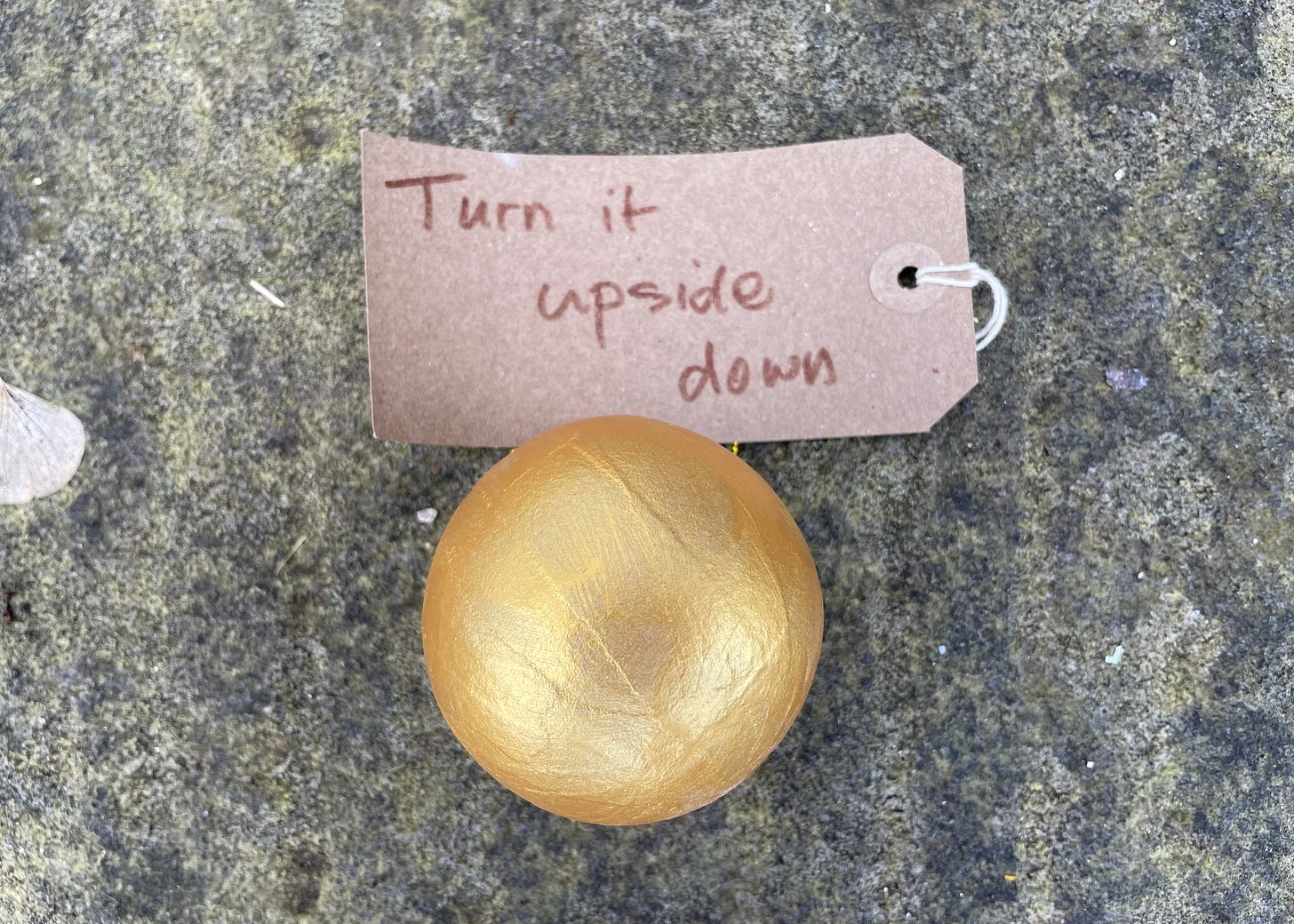At a recent Narrative Leadership workshop initiated by writer and storyteller Geoff Mead, we followed the thread of a Russian folk tale[i] The story can be told in longer or shorter form, but the essence is that a hunter marries a beautiful woman who is, of course, a magical being. When the Czar finds out about this, he wants her for himself, and plans to dispose of the hunter by commanding him to ‘Go I know not where, bring back I know not what’. The hunter’s wife gives him a golden ball to lead him through what seems to be an impossible challenge. As Geoff and his colleagues began to tell the story at the start of the workshop, we were all given a golden papier mâché ball to symbolically guide us through our explorations.
When listening to such a story, one is encouraged to notice which persons and events in the narrative catch one’s attention, and to reflect on the significance these carry for you. From the start, it was the title of the story, the Czar’s command, that engaged me. This carried, I felt, a lesson for our practice of talking with River and Learning how Land Speaks. For when I go to visit River, while I know I am going to my familiar spot where the Frome joins the Avon, in a deeper sense I don’t know where I am going, nor do I know what – if anything – I will bring back.
The essence of practice that we have described in Learning How Land Speaks is to invoke River as a self, a focus of meaning within the a cosmos which is open to communicate with us. This is what Freya Mathews describes as the practice of ontopoetics: once we accept that the world has the capacity to respond to us – indeed, seeks to respond – we must address it as a sentient presence. To call forth reality on an expressive plane we need to invoke it. Or, as I put it in River Song, my reworking of Leonard Cohen’s Suzanne
When you speak to her in person, you may find that she may answer
She may tell you of her secrets and tell you of her sorrows
And you’ll find that she’s your teacher…And you want to travel with her, and you want your eyes wide open
As you learn that you can trust her
For she’s touched your perfect body with her mind
You can listen to River Song on Soundcloud
River may respond to our invocation, not with words, but with poetic, metaphoric gestures that have a quality of absolute appropriateness to the moment which, as Freya puts it ‘draws us inescapably into intimacy’. When we experience such gestures – which we describe elsewhere (here and here) in these posts – we experience ‘moments of grace’:[ii] a crack opens in our taken-for-granted world of objects, and a world of living presence opens for us.
When I first started this work, in my early visits to River, I was full of expectations as to how River might respond to my call. Now that I had the intellectual understanding of living cosmos panpsychism, of a world full of communicative presence, surely River would speak to me in some dramatic manner. But of course, it was not until I dropped those expectations, learned how to open myself to River’s presence, that strange and deeply moving experiences were available to me.
Surrender is where it all starts; and where it all ends.
Participants on Living Waters inquiry workshops similarly speak of a longing to come into communication; and of feelings of failure, guilt, and unworthiness when ‘nothing seems to happen’ on a river visit. It is important, they reported, to allow oneself to truly be receptive to other, to River, to all the other persons. Participants found that what got in the way was the expectation of something spectacular. We need, they said, to let go of our own goals to step into this communication. Not just let go of our goals in order to have a powerful mystical experience, but just to surrender. Surrender is where it all starts; and where it all ends. To be in service.[iii]
And so, when visiting River, we must remember to ‘go I know not whither’ so that we might ‘bring back I know not what’.
‘Turn it upside down’
At the end of the narrative workshop, we were invited to draw a card from the Oblique Strategies[iv] pack. It was suggested we write the words on the card on a luggage label and attach it to the loop on our golden ball. I picked a card which instructed me to ‘Turn it upside down’.
It made me laugh.
What is ‘up’ for a golden ball? And how do you turn a golden ball ‘upside down’? Is this another enigmatic instruction for my visits to River?
[i] There are many versions of this story available online. This one with Free Books for Kids appeals to me for its simplicity of language.
[ii] I drew extensively on the metaphor of ‘grace’ in the story of my ecological pilgrimage at sea, In Search of Grace: An ecological pilgrimage. Winchester, UK: Earth Books, (2017).
[iii] These words are taken from reflections on learning halfway through Living Waters 2023, edited for clarity.
[iv] Oblique Strategies is a pack of cards devised by Brian Eno and Peter Schmidt to encourage creative and lateral thinking. Each card contains a gnomic suggestion, aphorism or remark which can be used to break a deadlock or dilemma situation.






Lovely! Thank you x
Lovely post! We can learn much from folk-tales. Not just the obvious "moral".